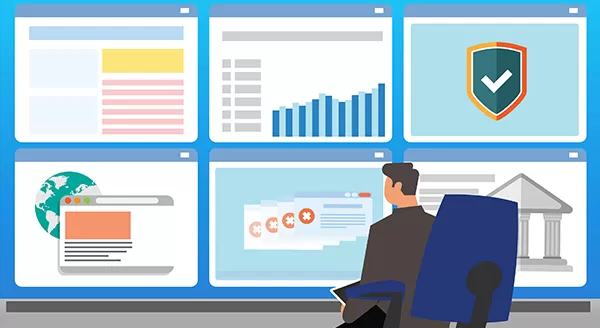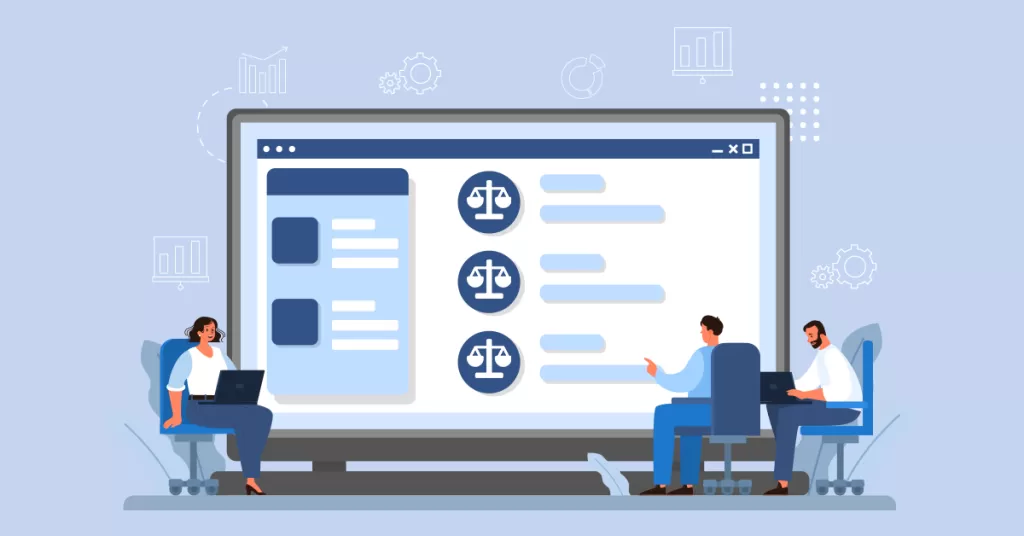Written By:
Scott McAuley
Scott is the IT Director of Texas Management Group, and has been in the IT industry for 25 years.
Choosing the right Legal IT Support provider can feel like a daunting task, but it’s a decision that can make or break your law firm’s success. With technology playing a crucial role in everything from case management to client communication, the stakes are high.
But how do you find a provider that truly understands the unique needs of a legal practice? In this article, we’ll guide you through everything you need to know in choosing the right legal IT Support Provider.
Whether you’re upgrading your current IT support or starting from scratch, these tips will help you make an informed choice. Ready to find the perfect partner for your firm’s tech needs?
Let’s explore what sets the best Legal IT Support providers apart.
Key Takeaways
- Choosing the right Legal IT Support provider is crucial for law firms, directly impacting their success in managing casework, client communication, and overall operations.
- A provider with expertise in legal software and a deep understanding of the legal industry ensures tailored IT solutions that enhance efficiency and compliance.
- Cybersecurity is paramount in legal IT support, requiring providers to implement robust security measures to protect sensitive client data and adhere to legal regulations.
- Evaluating potential IT support providers involves assessing their technical capabilities, experience with legal technology, and compatibility with existing systems.
- Long-term success with a Legal IT Support provider depends on clear communication, scalable solutions, and a strong focus on continuous improvement and collaboration.
Table of Contents
Understanding Your Legal IT Support Needs

Optimizing your law firm’s technology is essential for maintaining efficiency, security, and scalability. A thorough assessment of your current IT infrastructure is the first step in identifying areas that need improvement, enabling you to select a Legal IT Support Provider that aligns with your firm’s specific goals and requirements.
Here are the key considerations to help you understand and refine your legal IT support needs:
Assessing Your Current Legal IT Infrastructure
Review your hardware and software, including servers, workstations, and network devices. Identify outdated equipment and upgrade to support legal automation tools and data analytics.
Ensure systems handle current workloads and are prepared for future demands.
Identifying Gaps in Legal IT Setup
Identify inefficiencies, such as outdated software, inadequate storage, or lack of mobile device management. Evaluate your readiness for advanced tools like e-discovery and legal project management software to boost productivity and competitiveness.
Ensuring Legal Compliance and IT Security
Ensure your IT infrastructure meets regulatory standards like HIPAA and GDPR. Review firewalls, encryption, and antivirus measures. Address security gaps to safeguard against breaches and maintain compliance.
Supporting Specialized Legal Software
Evaluate your use of legal practice management tools. IT support should optimize software performance, ensuring smooth operation and minimizing disruptions.
Planning for Future Growth and Scalability in Legal IT
Choose scalable IT solutions for expanding data storage, users, and locations. Partner with a Legal IT Support Provider offering flexible services to support your long-term goals.
Integrating Legal IT Systems with Existing Infrastructure
Ensure new technologies integrate with existing hardware and software. A knowledgeable IT provider can guide seamless integration, minimizing disruptions and maintaining functionality.
10 Essential Qualities in a Legal IT Support Provider
Selecting the right Legal IT Support Provider is critical for maintaining a secure, efficient, and adaptable technology infrastructure for your law firm. B
Below are the top qualities to consider:
| Quality | Description |
|---|---|
| Legal IT Expertise | Deep knowledge of legal tech and industry challenges. |
| Experience with Legal Technology | Proven success in managing legal-specific IT solutions. |
| Proactive Maintenance | Regular audits and updates to prevent issues. |
| 24/7 Monitoring & Support | Continuous monitoring and immediate issue resolution. |
| Data Security & Compliance | Strong security and compliance with regulations like GDPR, HIPAA. |
| Incident Response & Recovery | Swift response and recovery from breaches or data loss. |
| Transparent Communication | Clear communication and regular performance reports. |
| Scalable IT Solutions | Solutions that grow with your firm’s needs. |
| Customizable Support Plans | Tailored plans for specific firm requirements. |
| Proven Track Record | Verified success with strong client references. |
1. Expertise in Legal IT and Industry Knowledge
A strong IT provider must have deep expertise in legal technologies and a clear understanding of the legal industry’s unique demands. This ensures they can offer tailored solutions that improve operational efficiency and ensure regulatory compliance.
2. Experience with Legal Technology Solutions
Proven experience in implementing and managing legal-specific technology is essential. Providers with a strong track record can anticipate potential issues and deliver proactive solutions that keep your systems running smoothly.
3. Proactive Maintenance and Support
Regular system audits, updates, and optimizations are key to preventing IT issues before they disrupt operations. Proactive support reduces downtime and enhances productivity, allowing your team to focus on their core responsibilities.
4. 24/7 Monitoring and Emergency Support
Law firms often need support beyond traditional business hours, making 24/7 monitoring critical. A reliable IT provider ensures any issues are resolved immediately, preventing delays that could impact your practice.
5. Robust Data Security and Compliance
Data security is paramount for law firms that manage sensitive client information. Your IT provider must implement strong security protocols and ensure compliance with regulations like GDPR and HIPAA.
6. Effective Incident Response and Data Recovery
In the event of a breach or data loss, swift and effective incident response is critical. A competent provider will have a defined plan for handling incidents and ensuring quick data recovery with minimal disruption.
7. Transparent Communication and Regular Reporting
Clear, transparent communication is essential for a successful partnership. Your IT provider should provide regular reports on system performance and security, keeping you informed about your IT environment.
8. Scalability of IT Solutions
As your firm grows, so will your IT requirements. A good IT support provider offers scalable solutions that expand with your firm’s needs, preventing costly overhauls and ensuring long-term success.
9. Customizable IT Support Plans
Every law firm has unique IT needs. Look for providers who offer customizable support plans, so you only pay for the services that fit your firm’s specific requirements.
10. Proven Track Record and References
A reliable IT provider should have a history of success in the legal industry. Look for strong references and a proven track record to ensure they can meet your firm’s needs effectively.
How to Choose the Right Legal IT Support Provider?
Selecting the right Legal IT Support Provider is a critical decision for law firms, as it directly impacts their operational efficiency, data security, and overall success.
With the legal industry becoming increasingly reliant on technology, it’s essential to choose a provider who not only has strong technical skills but also understands the unique demands of the legal sector.
Here are the key factors to consider when evaluating and choosing the best Legal IT Support Provider for your firm:
1. Thoroughly Researching Potential Providers
When selecting a Legal IT Support Provider, comprehensive research is crucial. Focus on providers with extensive experience in the legal sector, as they are more likely to understand the specific challenges your firm faces.
According to the ABA Tech Report, 96% of legal professionals consider a vendor’s reputation a critical factor when selecting legal technology solutions. Begin your evaluation by checking references and reading reviews from other law firms.
This will give you insight into the provider’s reputation, reliability, and track record of success in delivering legal IT services.
2. Requesting Case Studies on Legal IT Support Success
To gauge a provider’s effectiveness, request detailed case studies that showcase their expertise in addressing legal IT challenges. Look for examples where the provider has successfully improved efficiency, reduced costs, and enhanced workflows for their clients.
These case studies should highlight their proficiency in areas such as legal document management, eDiscovery, and litigation support.
A provider’s ability to present real-world solutions that align with your firm’s needs is a strong indicator of their capability to deliver results.
3. Assessing Technical Capabilities and Legal IT Expertise
Assessing the technical capabilities of potential providers is essential to ensure they can meet your firm’s specific IT needs. The provider should have a deep understanding of law firm IT consulting and be proficient in implementing and managing eDiscovery solutions.
Additionally, they should stay current with the latest legal technology trends and best practices. This knowledge will help your firm remain competitive, compliant with regulations, and capable of leveraging new technologies to enhance service delivery.
4. Ensuring Compatibility with Legal Software and IT Systems
Compatibility between your existing IT systems and the solutions offered by a potential provider is critical to avoid costly and disruptive migrations.
Ensure that the provider can seamlessly integrate with your current legal technology stack, including popular solutions.
By ensuring compatibility, you reduce the risk of disruptions and ensure that all systems work together effectively to support your firm’s operations.
5. Comparing Costs and Service Level Agreements (SLAs)
Cost is an important factor, but it should be weighed against the scope of services and the terms of the Service Level Agreements (SLAs) offered by potential providers.
Carefully review the SLAs to understand the provider’s commitment to response times, support availability, and penalties for non-compliance.
Efficient legal IT support can save your firm significant resources. For example, delays in purchasing legal software can cost firms $6,800 per month, while prompt implementation can save an average of $89,000 per year for a team of five.
6. Evaluating Response Times and Penalties in Legal IT SLAs
Response times and penalties in SLAs are crucial components of a Legal IT Support contract. Ensure that the provider guarantees timely support and resolution to minimize downtime, which can severely impact productivity and profitability.
Look for providers with a proven track record of meeting or exceeding their SLA commitments. High service levels, backed by enforceable penalties, ensure that your firm receives the support it needs when it needs it most, preventing costly delays and disruptions.
7 Steps to Finalizing the Selection of a Legal IT Support Provider
Choosing the right Legal IT Support Provider is a crucial decision for ensuring the efficiency and security of a law firm’s operations.
Here’s a streamlined guide to finalize your selection:
| Step | Description |
|---|---|
| Interviewing Key Personnel | Assess expertise, problem-solving, and cultural fit. |
| Conducting On-Site Visits | Evaluate infrastructure, security, and professionalism. |
| Running a Pilot Project | Test performance in real-world scenarios. |
| Reviewing Performance During Trial | Analyze responsiveness and technical skills from trial feedback. |
| Negotiating Terms and Conditions | Define SLAs, pricing, and security terms in the contract. |
| Developing Onboarding Plan | Plan provider’s integration with audits and staff training. |
| Establishing Long-Term Collaboration | Set regular check-ins and scalability strategies. |
Step 1: Interviewing Key Personnel of Legal IT Support Providers
Conduct comprehensive interviews with key personnel to assess their technical expertise, problem-solving abilities, communication approach, and understanding of the legal industry.
Focus on how well the provider’s team fits with your firm’s culture and their experience with legal-specific software and compliance.
Step 2: Conducting On-Site Visits
Visit the provider’s facilities to evaluate their infrastructure, security protocols, disaster recovery systems, and overall professionalism. This step offers insights into their operational capabilities, data security measures, and scalability.
Step 3: Running a Pilot Project
Test the provider’s performance with a pilot project simulating real-world scenarios like software updates or cybersecurity issues. This trial run assesses response times, technical proficiency, and problem-solving in a live environment.
Step 4: Reviewing Performance During the Trial Period
Analyze the provider’s performance in the pilot, focusing on responsiveness, technical expertise, and teamwork. Document any issues and gather feedback from your team on communication, adaptability, and reliability.
Step 5: Negotiating Terms and Conditions
Clearly define contract terms, including service level agreements (SLAs), response times, pricing, and data security. Discuss contract renewal or termination conditions to ensure mutual understanding and prevent future conflicts.
Step 6: Developing a Comprehensive Onboarding Plan
Create a detailed onboarding plan outlining the provider’s transition into your firm. This includes system audits, data migrations, and staff training, ensuring minimal disruption and a smooth start.
Step 7: Establishing Long-Term Collaboration and Support
Set up regular check-ins, performance reviews, and strategic planning sessions to ensure the provider remains aligned with your firm’s evolving needs. Discuss scalability and future technological growth to maintain a long-term partnership.
Conclusion
Choosing the right Legal IT Support provider is a crucial decision that can significantly impact your law firm’s efficiency, security, and overall success.
By focusing on expertise in legal technology, strong cybersecurity measures, and a proven track record, you can find a provider that truly understands your firm’s unique needs.
Take actionable steps by thoroughly researching potential providers, running pilot projects, and negotiating clear terms to ensure a strong, long-term partnership. Ready to elevate your firm’s IT infrastructure?
Start your search today and explore how the right Legal IT Support can propel your practice forward.
Looking to Choose the Best IT Support for Your Law Firm?
Explore our law-focused blogs for tips on finding a provider that meets your firm’s specific needs. Our law firm IT solutions offer robust security and efficiency for your practice.
Schedule a consultation today to learn more!
FAQ
What Factors Should be Considered When Selecting a Legal IT Support Provider?
Consider factors like industry experience, security expertise, customer service, and scalability.
How Can a Law Firm Assess the Expertise of a Potential IT Support Provider?
A law firm can assess expertise by reviewing client testimonials, case studies, certifications, and industry-specific knowledge.
What Questions Should a Law Firm Ask When Evaluating IT Support Providers?
Ask about their experience with legal tech, data security practices, response times, and support options.
How Important is Industry-Specific Experience When Choosing a Legal IT Support Provider?
Industry-specific experience is crucial as it ensures the provider understands legal requirements, compliance, and specialized software needs.






